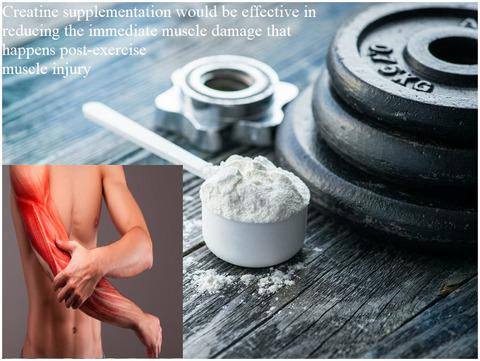当前位置:
X-MOL 学术
›
J. Food Biochem.
›
论文详情
Our official English website, www.x-mol.net, welcomes your
feedback! (Note: you will need to create a separate account there.)
Creatine supplementation effect on recovery following exercise-induced muscle damage: A systematic review and meta-analysis of randomized controlled trials
Journal of Food Biochemistry ( IF 3.5 ) Pub Date : 2021-09-02 , DOI: 10.1111/jfbc.13916 Yue Jiaming 1 , Mohammad Hossein Rahimi 2
Journal of Food Biochemistry ( IF 3.5 ) Pub Date : 2021-09-02 , DOI: 10.1111/jfbc.13916 Yue Jiaming 1 , Mohammad Hossein Rahimi 2
Affiliation

|
Exercise-induced muscle damage (EIMD) causes increased soreness, impaired function of muscles, and reductions in muscle force. Accumulating evidence suggests the beneficial effects of creatine on EIMD. Nevertheless, outcomes differ substantially across various articles. The main aim of this meta-analysis was to evaluate the effect of creatine on recovery following EIMD. Medline, Embase, Cochrane Library, Scopus, and Google Scholar were systematically searched up to March 2021. The Cochrane Collaboration tool for examining the risk of bias was applied for assessing the quality of studies. Weighted mean difference (WMD), 95% confidence interval (CI), and random-effects model, were applied for estimating the overall effect. Between studies, heterogeneity was examined using the chi-squared and I2 statistics. Nine studies met the inclusion criteria. Pooled data showed that creatine significantly reduced creatine kinase (CK) concentration overall (WMD = −30.94; 95% CI: −53.19, −8.69; p = .006) and at three follow-up times (48, 72, and 96 hr) in comparison with placebo. In contrast, effects were not significant in lactate dehydrogenase (LDH) concentration overall (WMD = −5.99; 95% CI: −14.49, 2.50; p = .167), but creatine supplementation leaded to a significant reduction in LDH concentrations in trials with 48 hr measurement of LDH. The current data indicate that creatine consumption is better than rest after diverse forms of damaging and exhaustive exercise or passive recovery. The benefits relate to a decrease in muscle damage indices and improved muscle function because of muscle power loss after exercise.
中文翻译:

肌酸补充剂对运动引起的肌肉损伤后恢复的影响:随机对照试验的系统评价和荟萃分析
运动引起的肌肉损伤 (EIMD) 会导致酸痛加剧、肌肉功能受损和肌肉力量下降。越来越多的证据表明肌酸对 EIMD 有益。然而,不同文章的结果差异很大。该荟萃分析的主要目的是评估肌酸对 EIMD 后恢复的影响。系统检索了 Medline、Embase、Cochrane 图书馆、Scopus 和 Google Scholar,直至 2021 年 3 月。用于检查偏倚风险的 Cochrane 协作工具被用于评估研究质量。应用加权平均差 (WMD)、95% 置信区间 (CI) 和随机效应模型来估计整体效应。在研究之间,使用卡方和I 2检查异质性统计数据。九项研究符合纳入标准。汇总数据显示,肌酸显着降低了总体肌酸激酶 (CK) 浓度(WMD = -30.94;95% CI:-53.19、-8.69;p = .006)和三个随访时间(48、72和 96 小时) ) 与安慰剂相比。相比之下,总体乳酸脱氢酶 (LDH) 浓度的影响不显着(WMD = -5.99;95% CI:-14.49, 2.50;p = .167),但在 48 小时 LDH 测量试验中,补充肌酸导致 LDH 浓度显着降低。目前的数据表明,在各种形式的破坏性和力竭运动或被动恢复后,肌酸摄入量优于休息。由于运动后肌肉力量损失,这些好处与肌肉损伤指数的降低和肌肉功能的改善有关。
更新日期:2021-10-06
中文翻译:

肌酸补充剂对运动引起的肌肉损伤后恢复的影响:随机对照试验的系统评价和荟萃分析
运动引起的肌肉损伤 (EIMD) 会导致酸痛加剧、肌肉功能受损和肌肉力量下降。越来越多的证据表明肌酸对 EIMD 有益。然而,不同文章的结果差异很大。该荟萃分析的主要目的是评估肌酸对 EIMD 后恢复的影响。系统检索了 Medline、Embase、Cochrane 图书馆、Scopus 和 Google Scholar,直至 2021 年 3 月。用于检查偏倚风险的 Cochrane 协作工具被用于评估研究质量。应用加权平均差 (WMD)、95% 置信区间 (CI) 和随机效应模型来估计整体效应。在研究之间,使用卡方和I 2检查异质性统计数据。九项研究符合纳入标准。汇总数据显示,肌酸显着降低了总体肌酸激酶 (CK) 浓度(WMD = -30.94;95% CI:-53.19、-8.69;p = .006)和三个随访时间(48、72和 96 小时) ) 与安慰剂相比。相比之下,总体乳酸脱氢酶 (LDH) 浓度的影响不显着(WMD = -5.99;95% CI:-14.49, 2.50;p = .167),但在 48 小时 LDH 测量试验中,补充肌酸导致 LDH 浓度显着降低。目前的数据表明,在各种形式的破坏性和力竭运动或被动恢复后,肌酸摄入量优于休息。由于运动后肌肉力量损失,这些好处与肌肉损伤指数的降低和肌肉功能的改善有关。









































 京公网安备 11010802027423号
京公网安备 11010802027423号